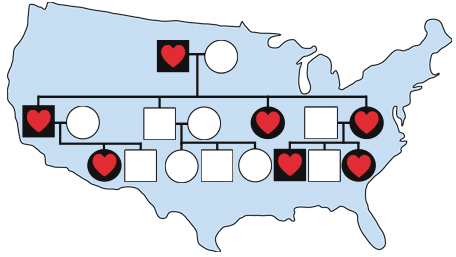Search Results
10 results for population screening
Genomics and Population Health Action: The Collaboration Continues!

In March 2018, I attended the third annual meeting of leaders of the Genomics and Population Health Action Collaborative (GPHAC). GPHAC was formed late in 2015 under the auspices of the National Academy of Medicine’s Roundtable on Genomics and Precision Health to foster collaboration of more than 50 diverse stakeholders, including state public health programs,
Posted on byProgress in Public Health Genomics Depends on Measuring Population Level Outcomes

Public health genomics is a relatively young field concerned with the effective and responsible translation of genomic science into population health benefits. In the past few years, the field has witnessed the emergence of several state public health genomics programs beyond the traditional domain of newborn screening. The field has focused on preventing disease and
Posted on byCascade Screening for Familial Hypercholesterolemia in the United States: Public Health Impact and Challenges

This post is a summary of our recently published paper in JAMA and outlines the public health impact and challenges for cascade screening for Familial Hypercholesterolemia (FH) in the United States. What is the public health impact of cascade screening for FH? FH is a dominantly-inherited genetic disorder affecting about 1 in 250 people and
Posted on byGenomics and Population Health Action: Join the Collaboration

In February 2017, I attended a one-day meeting of leaders of the Genomics and Population Health Action Collaborative (GPHAC). This group of more than 40 organizations and individuals is dedicated to the integration of genomics into clinical and public health programs to save lives and prevent disease. (Details on GPHAC and its membership can be
Posted on byPrecision Medicine and Population Health: Dealing With the Elephant in the Room

In this week’s Journal of American Medical Association, we published a point-counterpoint commentary on the impact of precision medicine on population health. Announcement of the news of the US precision medicine initiative has been met with a range of responses from enthusiasm to skepticism about potential benefits, limitations and return on investment. In considering the
Posted on by 2 CommentsCancer Precision Medicine: More Population Sciences Ahead!

We explore briefly the expanding role of population sciences in the implementation of the NIH Precision Medicine Initiative (PMI). The initiative includes a major component on cancer precision treatment, and a large scale cohort study program to generate knowledge applicable to all areas of health and disease, including cancer risk factors and outcomes. Genomics is
Posted on byNewborn screening in the genomics era: are we ready for genome sequencing?

Recent advances in next generation sequencing (NGS) could potentially revolutionize newborn screening, the largest public health genetics program in the United States and around the world. Over the last five decades, newborn screening has grown from screening for one condition (phenylketonuria (PKU)) in one state, to nationwide screening for at least 31 severe but treatable
Posted on by 2 CommentsA Public Health Genomic State-by-State Clickable Map: Accelerating Implementation of Genomics Applications to Improve Population Health

In recent years, public health programs in several states have used innovative approaches to implement evidence-based genomic testing recommendations in an effort to improve health outcomes for people at increased hereditary risk for breast, ovarian, colorectal and other cancers. For example, the Michigan Department of Community Health [PDF 1.04 MB] has partnered with payers in
Posted on by 1 CommentNew Strategies For Public Health Genomics Beyond Newborn Screening

A Working Meeting and an Action Plan to Save Lives Now Nearly 2 million Americans are affected by one of three genetic conditions with a strong risk of early morbidity and mortality: BRCA 1/2 and hereditary breast and ovarian cancer; Lynch syndrome and colorectal , endometrial and ovarian cancer; and familial hypercholesterolemia and early cardiovascular events. At
Posted on by 2 CommentsMaking Universal Screening for Lynch Syndrome a Reality: The Lynch Syndrome Screening Network

Every day, about 400 people in the United States are diagnosed with colorectal cancer. Approximately twelve of them have Lynch syndrome, a hereditary condition that increases the risk of colorectal cancer and other cancers. Identifying people with Lynch syndrome could have substantial health benefits for them, their families, and communities.
Posted on by 1 Comment

